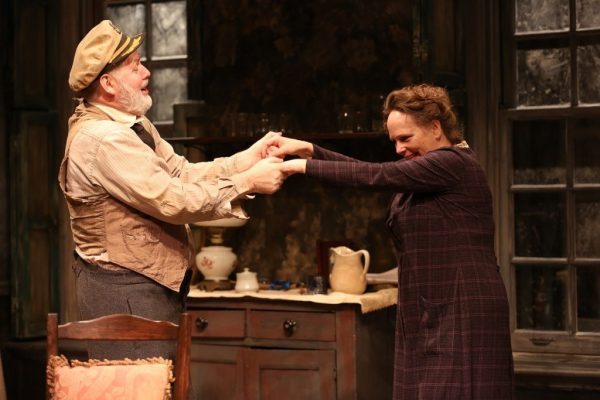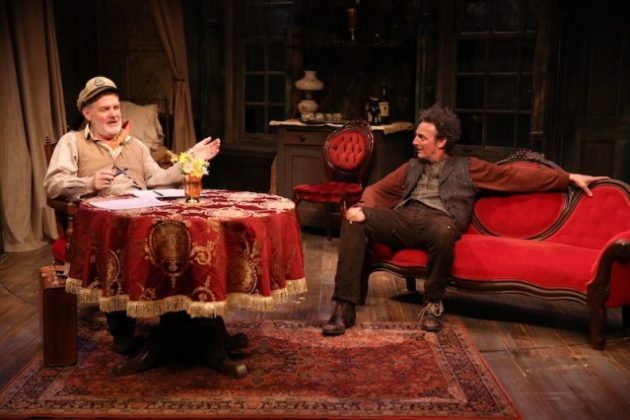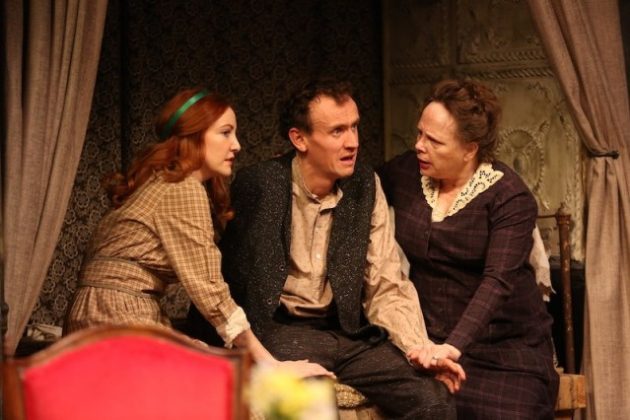
Capt. Boyle (Ciarán O’Reilly) and his wife, Juno (Maryann Plunkett), see brighter days ahead in Juno and the Paycock (photo by Carol Rosegg)
Irish Repertory Theatre, Francis J. Greenburger Mainstage
132 West 22nd St. between Sixth & Seventh Aves.
Through May 25, $50-$70
212-727-2737
irishrep.org
The Irish Rep’s inaugural 1988–89 season included The Plough and the Stars, part of Sean O’Casey’s 1923–26 Dublin Trilogy; the company brought it back again in 1997. To celebrate its thirtieth anniversary season, the Irish Rep is presenting revivals of the first two plays in the trilogy, the 1924 Juno and the Paycock and the 1923 The Shadow of the Gunman, in repertory through May 25, along with screenings of the 1937 John Ford film version of The Plough and the Stars with Barbara Stanwyck, Preston Foster, and Barry Fitzgerald and a reading series. For the occasion, which the Irish Rep is calling “The O’Casey Cycle,” the Francis J. Greenburger Mainstage theater has been transformed into a ramshackle 1920s tenement; Charlie Corcoran’s set extends well beyond the stage: Windows and brick walls run up the sides and down the hall, clothes are hanging to dry by the balcony, and there’s even a small bed hidden beneath the stairs by the restrooms. It’s now back in a “darling” adaptation after previous stagings at the Irish Rep by artistic director Charlotte Moore in 1995 and 2013–14.

Capt. Boyle (Ciarán O’Reilly) waxes philosophic with Joxer Daly (John Keating) in Sean O’Casey revival at the Irish Rep (photo by Carol Rosegg)
Juno and the Paycock takes place in 1922, during the Irish Civil War between the Diehard Republicans and the Free Staters, as matriarch Juno Boyle (Tony winner Maryann Plunkett) is trying to make ends meet in her family’s small apartment. Her husband, Capt. Boyle (Ciarán O’Reilly), spends most of his time, and what little money they have, hitting the pub with his best friend, the gangly ne’er-do-well Joxer Daly (John Keating), and complaining about terrible pains in his legs whenever the possibility of a job arises; their daughter, Mary (Sarah Street), is on strike with her trade union; and their son, Johnny (Ed Malone), is a bitter young man who lost an arm in the revolution and is worried that the IRA will show up at any moment to right a wrong. The Boyles hit the jackpot when schoolteacher Charles Bentham (James Russell) arrives to tell them that Capt. Boyle has inherited a significant sum of money from a dead relative. Mary, who has been courted by nudnik Jerry Devine (Harry Smith), begins dating the elegant Bentham, and the captain and Juno immediately start celebrating their good fortune by refurnishing their home and considering moving to a better location. But being a classic Irish melodrama about the futility of the working and lower classes, prosperity is not necessarily waiting for them around the corner.

Johnny (Ed Malone) is nervous as his sister, Mary (Sarah Street), and mother, Juno (Maryann Plunkett), try to calm him down in Juno and the Paycock (photo by Carol Rosegg)
Seamlessly directed by Neil Pepe, the longtime artistic director of the Atlantic Theater, Juno and the Paycock is a joy to behold. It’s somewhat reminiscent of The Honeymooners, only Irish, with Capt. Boyle / Ralph Kramden always scheming to fill his empty coffers, the none-too-bright Joxer / Ed Norton unwittingly by his side, offering comic relief, and Juno / Alice doing her best to keep it all together. “There’ll never be any good got out o’ him so long as he goes with that shouldher-shruggin’ Joxer,” Juno says about her husband. “I killin’ meself workin’, an’ he sthruttin’ about from mornin’ till night like a paycock!” As downtrodden as the times are, O’Casey injects plenty of humor into the story, which was also made into a film by Alfred Hitchcock in 1930. The cast, which is very similar to the 2013–14 edition (the main changes are Plunkett as Juno and Street as Mary; Terry Donnelly has played neighbor Maisie Madigan in all three Irish Rep versions), is outstanding, fully embodying a troubled family and its tight-knit, suspicious community, making the most of O’Casey’s well-drawn characters.
The socioeconomic conditions of 1920s Dublin might not provide a lot of opportunities for the Boyles, but they also have to take a long, hard look at themselves for the desperate situation they’re in, at least some of which they bear responsibility for, as O’Casey explores the concept of living by one’s principles. It’s also about looking forward. “Maybe, Needle Nugent, it’s nearly time we had a little less respect for the dead, an’ a little more regard for the livin’,” Mrs. Madigan says to the tailor (Robert Langdon Lloyd). Joxer, wonderfully played by the tall, gangly, wild-haired Keating, the longtime Irish Rep treasure, has a habit of describing things as “darling,” and that’s just what this production is, a darling adaptation of a powerful, poignant play.